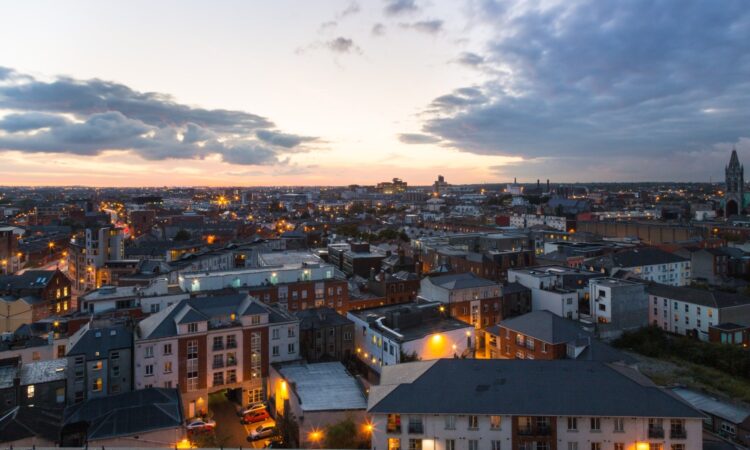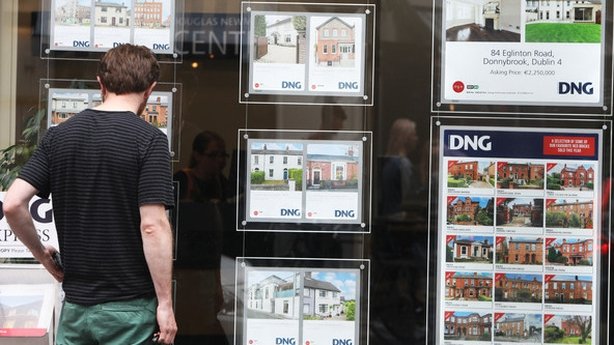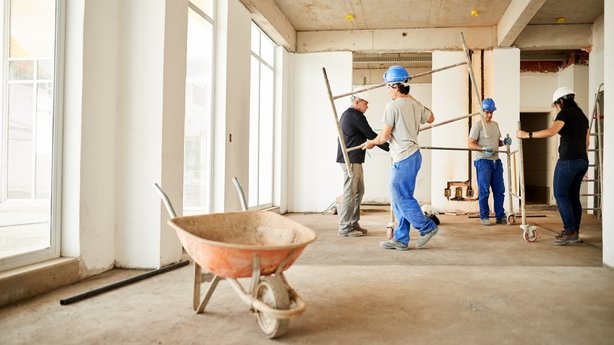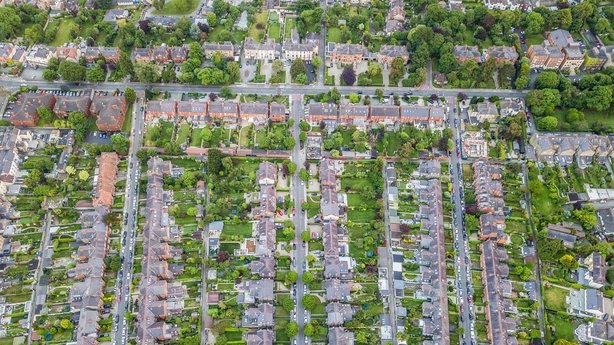
The laws of gravity dictate that what goes up, must come down.
But when it comes to the property market, the same rules don’t have to necessarily apply.
And so in recent months, as the rate of increase in the price of homes has softened and the economy has come under pressure, questions have begun to arise around whether a drop in prices could be on the cards.
That hypothesis was given more credence by research contained in the most recent ESRI Quarterly Economic Commentary, which suggested the residential property market here could be overvalued by as much as 7%.
The institute did not go as far as to suggest prices may fall – it said it was too early to tell. But it did say that the rate of price increases is likely to “moderate substantially”.
What have house prices been doing recently?
The Central Statistics Office released the latest Residential Property Price Index on Thursday.
It showed that nationally prices in the year to the end of August rose by 12.2% – the fifth successive month in which the annual rate of house price growth nationally slowed.
Since August of last year, the rate of increase had been climbing in double digits, and it peaked in the early part of the year, prior to the change in the economic climate internationally.
In February and March, it settled at 15.1%, but in April it fell back to 14.5%, then to 14.4% in May, followed by 14% in June, before easing back to 13.3% in July and 12.2% in August.
The trend has been broadly reflected both inside Dublin and outside the capital across the rest of the country, though the rate of increase remains stronger outside Dublin.
Both houses and apartments have also followed a similar pattern.
So what is causing the softening in price growth?
There are a huge number of factors that influence house prices.
Like any market though, at its heart it boils down fundamentally to supply and demand.
On the supply front, after years of extreme tightness, there are signs that the availability of houses to buy might be starting to loosen up a little.
Data on transaction volumes suggests a significant uptick in August because of the strength of the new homes market which saw a 42% increase in sales over a three-month period.
And that is helping to ease pressure on the rate of growth.
“We expect to see a further slowdown in price growth in the coming months as the volume of houses for sale finally starts to increase,” said Trevor Grant, Chairperson of the Association of Irish Mortgage Advisors.

“It was recently reported that there were 15,300 second-hand properties for sale nationwide in July, representing an annual increase of 1,800 properties,” Mr Grant said.
“The volume of homes changing hands since the start of the year has also increased; if the increased activity reported in the residential construction sector over the last few months continues, as is expected, this could really deliver for potential homeowners,” he added.
Demand is deflating too as rising interest rates and inflation push home ownership out of the reach of some with incomes on the margins of qualifying for a mortgage.
The European Central Bank has already increased rates by 1.25% and the expectation is there will be two further increases when the bank’s Governing Council meets on October 27 and December 15.
“These are impacting affordability and they are worrying people because no one knows how high they could go,” said Pat Davitt, chief executive of the Institute of Professional Auctioneers and Valuers.
“One has to wonder at the rationale for such interest rate hikes, given the pressures consumers across Europe are under,” he added.
Central Bank mortgage lending rules also continue to help keep a lid on house price inflation.
They are currently under review, with a decision expected before the end of the year on whether any changes are to be made.
Though given the recognition in the market that they are in general having the desired effect of preventing another credit fuelled bubble, significant alterations seem unlikely.
But are there ongoing pressures that are still keeping house prices high?
Yes there are.
We continue to have a severe shortage of housing and despite signs that progress may be being made, there is a long road to travel before we have the right number of homes for our population.
The other influence driving prices higher is inflation.
Construction price inflation was running at 14% on an annual basis in July, according to the Society of Chartered Surveyors.
The soaring cost of raw materials, labour and other factors continue to make building more expensive.
While some developers are absorbing some of those increases, others are passing them on in the prices they are charging for new homes, extensions and refurbishments.

Other builders, though, are simply choosing not to take on certain jobs at all, because they can’t make them pay.
If this continues, the bump in new home supply we saw earlier could tail off – putting upward pressure on prices.
A third factor at play is that while interest rates are rising, most of the main lenders here have not yet passed those increases on to borrowers – giving home purchasers some breathing space.
However AIB said on Friday that it will increase the interest rate it charges for new fixed rate mortgages by 0.5%. The change does not affect those customers who are already on a fixed rate or those on a variable rate.
Central Bank data released during the week showed average interest rates here remained steady in August, while at the same time across the euro zone they rose more markedly.
There is an expectation though that the banks won’t be able to hold out on passing through the extra borrowing costs forever.
“Ireland’s housing market is proving more resilient than international experience as Ireland is faced with an acute supply shortage and mortgage rates that are down on an annual basis due to consolidation in the banking sector implying increased competition with non-bank lenders,” said economist Shaun McDonnell at stockbrokers Goodbody.
How likely is it then that house prices could fall?
House prices here have recovered significantly since the depths of the post-Celtic Tiger crash.
Nationally they now stand at 2.2% above their highest level recorded in April 2007, just before the credit fuelled bubble catastrophically burst.
From January 2008 they fell for five straight years until June of 2013 when the recovery took hold.
And since then, there has only been one four-month period beginning in July 2020, at the height of the Covid-19 pandemic, that they have fallen slightly, before recovering strongly over the subsequent 24 months.
That recovery was in large part fuelled by significant household savings accumulated during pandemic lockdowns, along with disrupted supply and pent-up demand.
With that demand remaining strong and as supply has not yet caught up, experts say it is unlikely that prices will fall anytime soon.
“We’ve only really had one period in living memory, during the finance crisis of 2008, where we saw real reductions in the value of property,” said Trevor Grant.
“This was driven by a sustained period of easy credit, followed by an extremely severe recession, when unemployment spiked,” he stated.
“We haven’t had free flowing credit of that sort since and no-one seems to be predicting an unemployment spike, so it’s difficult to see what could cause house prices to fall in the coming months,” he said.
Shaun McDonnell, from stockbrokers Goodbody, also predicts that while annual property price growth will continue to slow in the coming months, a dip in prices seems unlikely.

“The acute shortage of supply, tighter credit standards, excess savings of €25 billion, and the lack of significant roll over in demand to date all suggest it is highly unlikely that property prices in Ireland will fall,” he said.
“We sustain the view that Ireland will continue to experience growth in prices throughout 2023, albeit at a lower pace than currently being experienced,” he said.
Others agree.
“At face value, the data point to little sign of any slowdown,” wrote Conall MacCoille, chief economist at Davy and author of MyHome.ie’s regular market reports.
“However, transactions settled in August were agreed several months ago. In contrast, our recent MyHome report showed that asking prices fell by 1% in Q3 2022, with annual inflation slowing to 7.8%,” he said.
“That said, our forecast for RPPI inflation to slow to 6% by December now looks a little too pessimistic,” he added.
And so it seems, property prices are set to continue rising.
Bad news for those looking to get on the property ladder or trade up – good news for those with one or more properties to their name.






